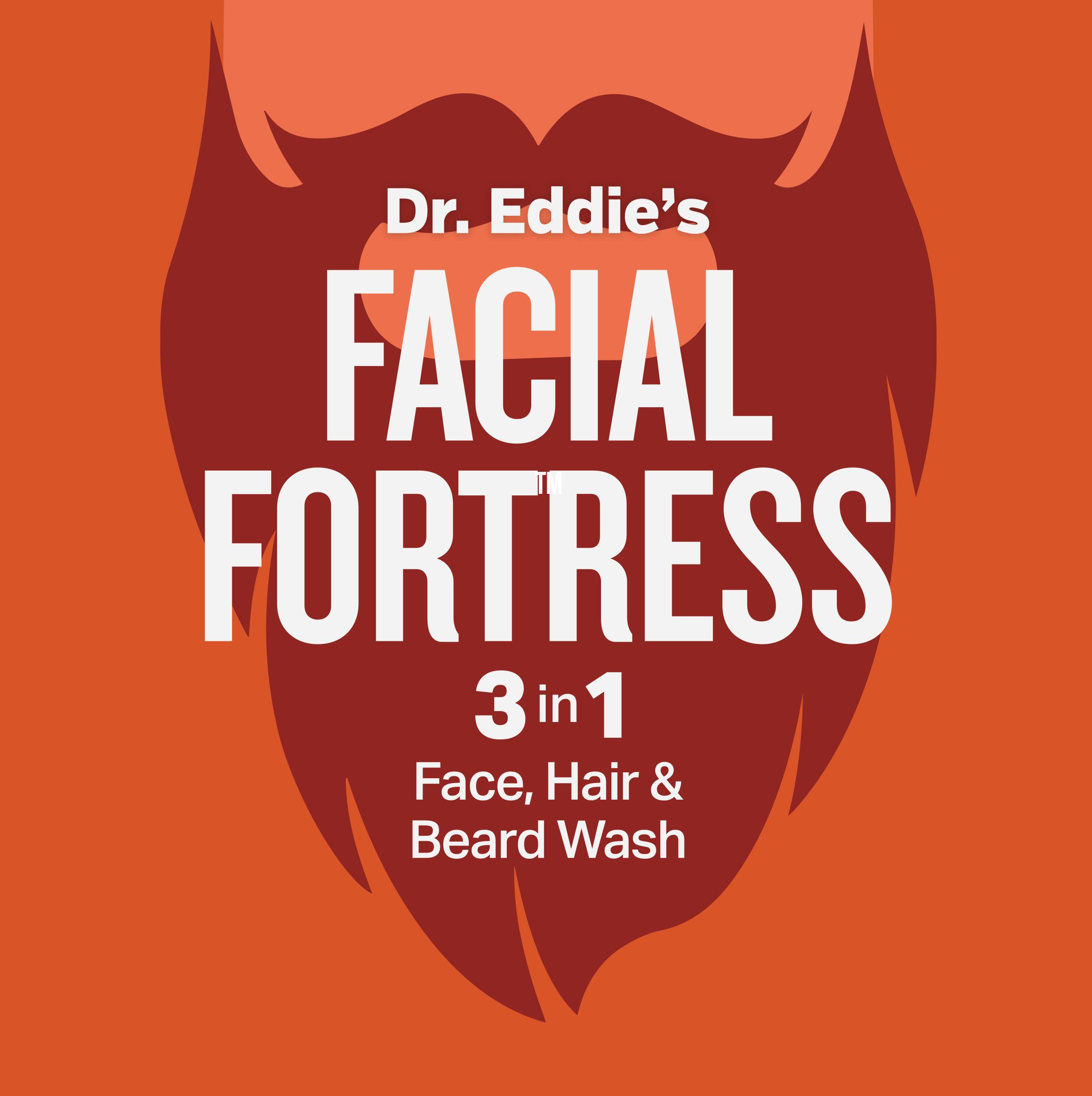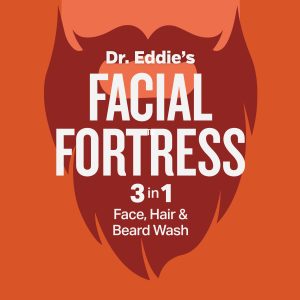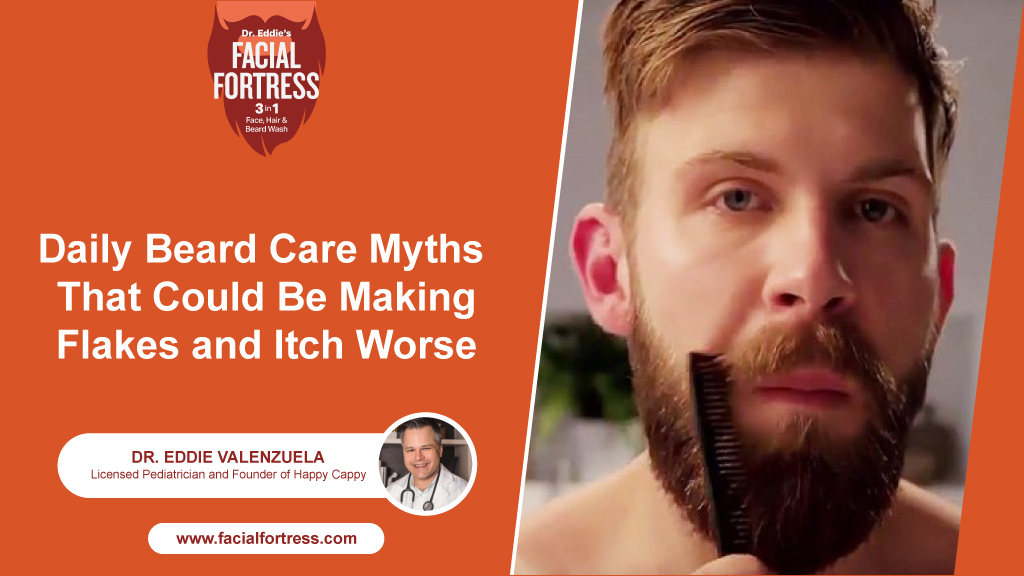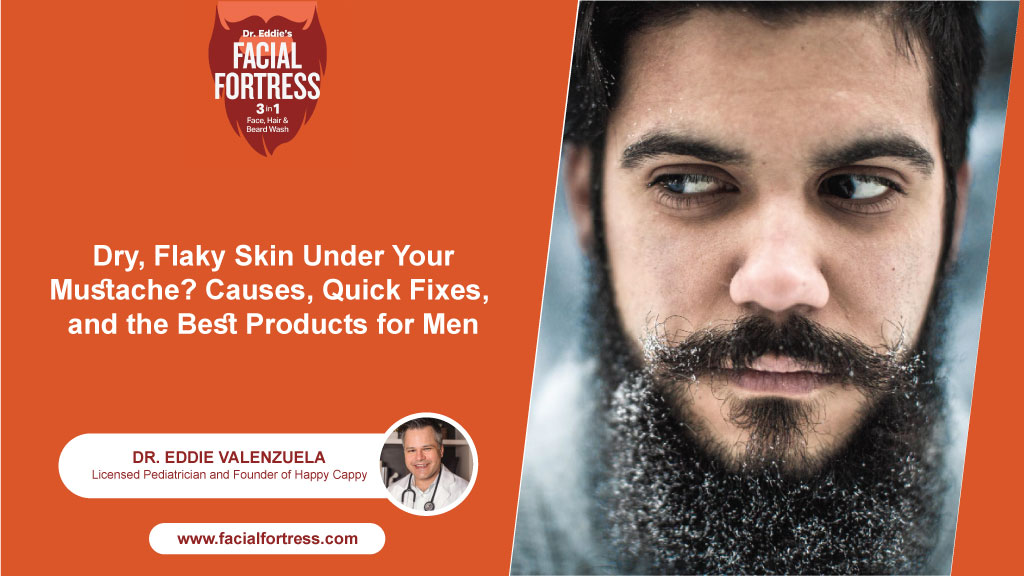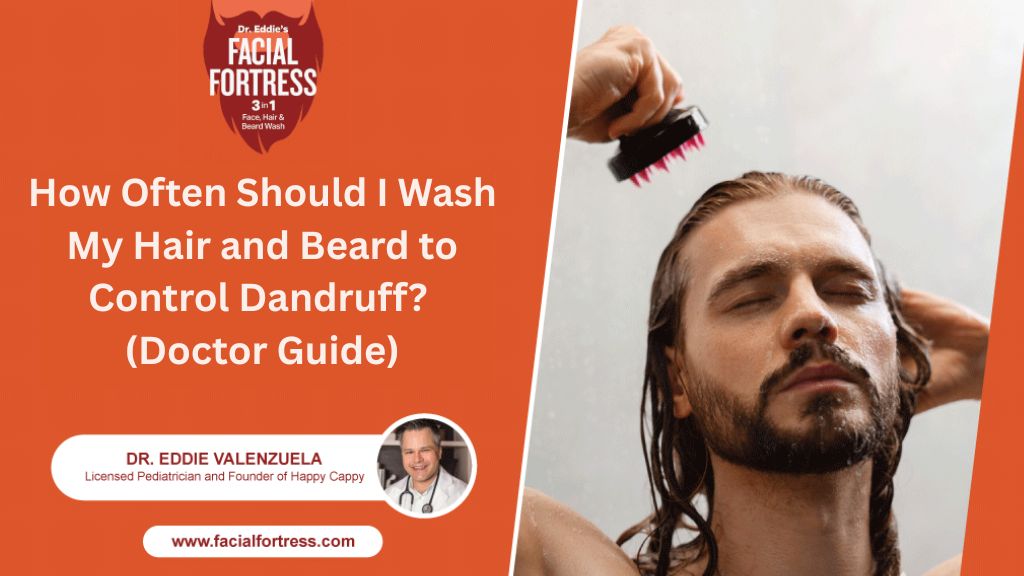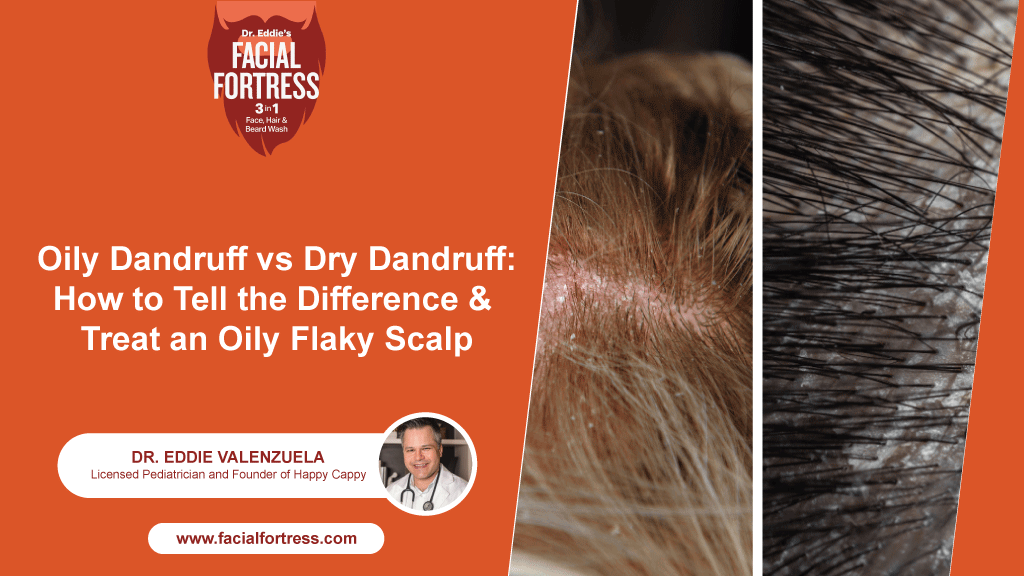Why Does My Hair Get Greasy So Fast
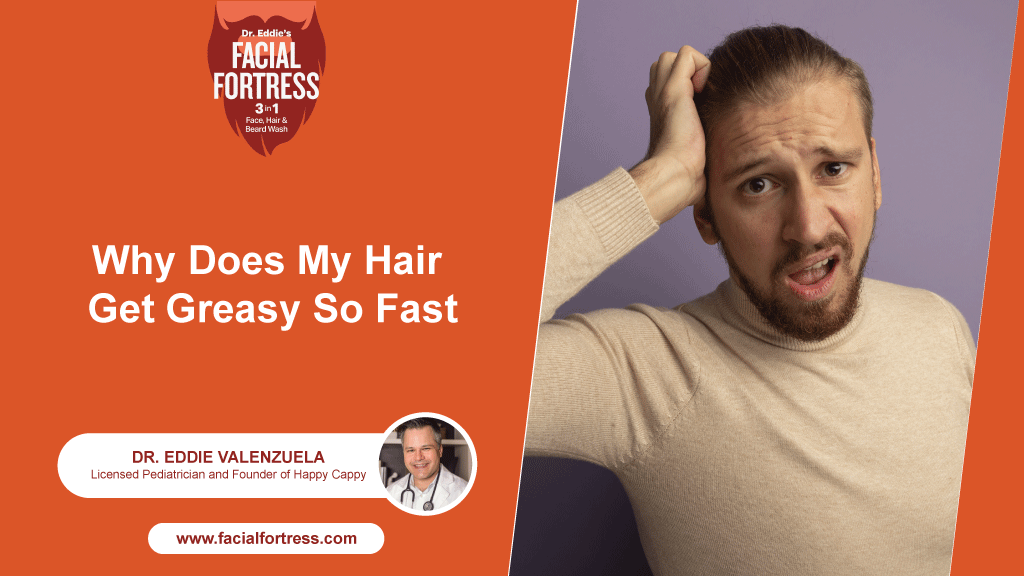
Greasy hair can be very frustrating, especially when you feel like you have to schedule everything around hair-washing days because washing, drying, and styling take so much of your time.
If you are also standing in front of the mirror and thinking to yourself, “why does my hair get greasy so fast?” Then don’t worry, you are not alone. While some people may naturally have an oily hair type, for others, certain hair care mistakes, skin conditions, or daily habits might be the reason behind their greasy hair.
However, the good thing is that once you pinpoint what is causing the greasiness, it becomes much easier to fix it. In this blog, you’ll find the 10 most common causes for greasy hair and effective ways to get rid of it so you can enjoy clean, fresh, and healthy hair every day.
What Does Greasy Hair Look Like?
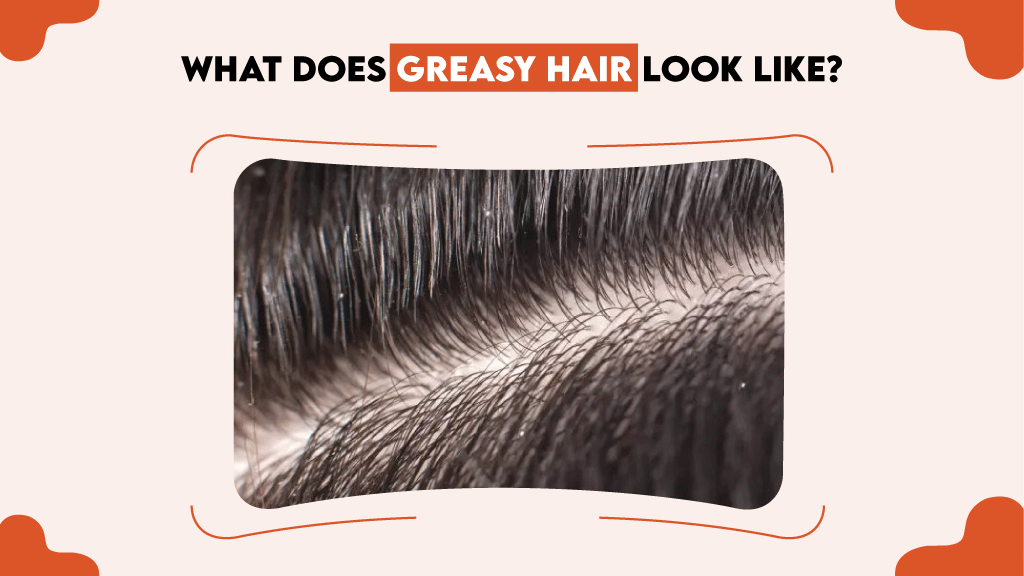
For those who have been dealing with oily hair for years, they would very well know what greasy hair looks like. But for those who have never had them, they can easily confuse oily hair with dirty hair.
Here are some of the key characteristics to look out for:
- The hair usually appears shiny, glossy, or wet.
- The hair lacks volume, which makes it look flat and lifeless.
- The hair strands may clump together in sections.
- The scalp feels greasy and oily.
- Hair starts looking dirty after a few hours of washing.
- Your hairstyle, especially curls and waves, falls out quickly.
If you are noticing these signs on a regular basis, then it is essential that you evaluate what’s causing the greasiness and how to get rid of it for good.
How Does Hair Get Oily?
You may have wondered at some point in your life, “why does hair get oily?” well there is a bit of science behind it. Our skin and scalp contain sebaceous glands that are responsible for producing sebum that helps keep the skin moisturized.
However, when these glands, for any reason, start producing excess sebum, it starts to build up on your scalp and makes your hair look and feel greasy and sticky. Now that we know why our hair gets oily, let’s look at the factors that might trigger the greasiness.
What Causes Hair to Get Greasy Fast?
If you often catch yourself wondering, “Why does my hair always look greasy?” we have got your answer. There are various factors that can lead to oily hair, from underlying skin conditions to the little mistakes that you might be making in your daily routine.
Here are the 10 most common causes of greasy hair.
1. Hormones
Most of the time, greasy hair is a result of hormonal imbalance. Fluctuations in hormonal levels can increase the production of sebum on the scalp and skin, which causes your hair to get oily fast.
2. Underwashing/Overwashing
Not washing your hair or washing it a lot, both can lead to an oily scalp and hair. If you are not washing your hair enough, then the sebum, dirt, and dandruff flakes can build up on the scalp and make your hair look oily.
Now you might be wondering, how can washing your hair more lead to oily hair? Well, the truth is that when you wash your scalp more than required, it gets dry, which triggers the sebaceous glands to start producing more sebum. And as a result, you start experiencing greasy, sticky hair.
3. Using the Wrong Products
One question we often come across is “can shampoo make your hair greasy?” The answer is yes. Not just shampoo, but using any wrong product can lead to greasy hair. Especially those products that contain harsh chemicals such as fragrances, parabens, sulfates, and phthalates which can strip away natural oils from the scalp that trigger the production of sebum and cause oily hair.
Also, if you have an oily scalp type, then using oil-based products can make your hair get greasy fast.
4. A Dirty Hairbrush
Most of us often don’t pay much attention to how dirty our hairbrush or comb is. Keeping your hairbrush clean is as important as washing your hair. Because the dirt, bacteria, and product residue can stick to the hair strands, which then transfer to the hair when you brush your scalp, giving you that oily hair.
5. Touching your Hair
Another common question often asked by men is “Does touching your hair make it greasy?” The answer is yes. While you may love touching and styling your hair with your fingers, the truth is that all the bacteria, dirt, and oil present on your hands then transfer to the hair strands, making them look greasy or dirty.
6. Dirty Linen
You may have seen your mother stressing about washing the dirty clothes and linens; well, she was right about doing it for many reasons, and one of them is that dirty linens can trigger greasy hair.
In the same way a dirty brush collects dirt, bacteria, oil, and product residue, your linen, especially the pillow covers, also collects them. And when you rest your scalp on them for a good night’s sleep, all of these transfer to your hair and cause it to become greasy quickly.
7. Hair Care Mistakes
While most of us try our best to take extra good care of our hair, we often make little mistakes that can actually lead to greasy, oily hair. Some of the common mistakes are:
- Not washing your scalp thoroughly and leaving product residue behind.
- Using hot water to wash your hair can trigger the sebaceous glands to produce more oil.
- Applying conditioner to the roots can also result in product buildup on the scalp.
- Using too much dry shampoo can also trigger a greasy scalp.
- Not brushing your hair at least once daily can lead to sebum buildup on the scalp and oily hair.
- Leaving any type of oil on your scalp overnight.
8. Change in Environment
If your hair is getting oily faster than usual, then the weather or environment might be to blame for it. While most of us are unaware of this, changes in weather conditions can affect how quickly our hair becomes greasy.
For example, during winter, due to the cold, dry air, your skin becomes dry more often, which causes the sebaceous glands to start producing more sebum, which, as a result, can lead to your hair getting greasy fast.
However, for some people, a hot, humid climate can also be the reason behind oily, dirty hair, and they may need to wash their hair every day due to the sweat and dirt buildup.
9. Dandruff
If you are experiencing super greasy hair and small white flakes on your hair or beard, then most probably you are experiencing dandruff. While most people think that dandruff is caused by dry skin, the reality is that overactive sebaceous glands and overgrowth of Malassezia yeast are the main factors that lead to dandruff.
A greasy scalp or hair is one of the common symptoms of dandruff or a more severe form of it known as seborrheic dermatitis.
10. Hard Water
The water that we use to wash our hair and scalp can have a great impact on our health. Hard water can cause your scalp to become dry and rough more easily, which then triggers the overproduction of sebum and often leads to oily hair.
How to Stop My Hair From Getting Greasy so Fast?

Now, if you are experiencing greasy hair, the first thing you would search for is “how to fix greasy hair fast.” We have your answer. Here are a few things that you can incorporate into your hair care routine to get rid of greasy hair and prevent it from getting greasy fast.
Wash Your Scalp
Washing your scalp is essential to remove all the dirt, bacteria, and sebum buildup that causes your hair to become greasy fast. Use a gentle shampoo for greasy hair to wash your scalp.
Now, one thing you have to make sure of is to set the right frequency of washing according to your scalp needs. If you have an extra oily scalp or have an active lifestyle, then you may need to wash your hair every day.
However, if you have a dry scalp type, then you need to wash your scalp 2 to 3 times a week. Setting the right frequency is a trial-and-error process; try different routines and notice which one works best for you.
Use the Right Products
Always look at the ingredients before buying any hair products, whether it’s your shampoo, conditioner, hair spray, or hair clay. Make sure the products you are using are
- Fragrance-free
- Paraben-free
- Sulfate-free
- Dimethicone-free
- Phthalate-free
And if you have excessively oily hair, choose water-based products instead of oil-based ones and avoid those that contain any type of oil as an ingredient. If you are searching for a shampoo free from these harsh chemicals, try Facial Fortress.
Clean your Hairbrush
Try keeping your hairbrush clean as much as possible. If you are wondering how to do it, here it is
- Remove hair from the brush after every brushing session.
- Wipe your brush or comb with a paper towel at least once daily.
- Wash your brush using a shampoo or brush cleanser at least once weekly.
- Before washing, soak it in hot water to remove any bacteria.
Wash your Linens
Try washing your linen at least once weekly to keep it clean. And if you live in an environment that has a lot of pollution and dust, then change or wash your linen at least twice weekly.
Also, make sure to use a fragrance-free detergent to wash your bedding because the harsh chemicals can react with your skin and cause it to become dry more often, especially if you have eczema-prone skin.
Manage Dandruff and Seborrheic Dermatitis
If your greasy hair is a result of dandruff or seborrheic dermatitis, then managing it will help you get rid of the greasy hair. The best way to manage itching, irritation, flaking, and oiliness caused by dandruff and seborrheic dermatitis is to use an anti-dandruff shampoo for greasy hair to wash your scalp.
Use one that contains pyrithione zinc as an active ingredient, as it has been known to be effective in reducing the flaking and itching associated with dandruff and seborrheic dermatitis.. Also, make sure the shampoo you are using is free from any harsh chemicals and is not oil-based, as they can make your condition worse.
Hair Care
As we were discussing before, little mistakes can make the scalp become greasy and hair oily; a few things that you can do to take extra care of your hair and prevent it from getting greasy more often are:
- Use lukewarm or cool water to wash your scalp.
- Don’t apply conditioner to the hair roots; instead, apply it only to the hair strands.
- Brush your hair at least once daily to distribute the sebum from the scalp to your hair strands.
- Try not to cover your scalp with a cap or cloth for long periods.
- Air-dry your hair after washing it.
- Make sure that you don’t leave any shampoo residue behind after washing.
- Avoid excess use of heat styling products, leave-on hair products, and dry shampoo.
These little things can go a long way and help you achieve a healthy, clean, fresh scalp.
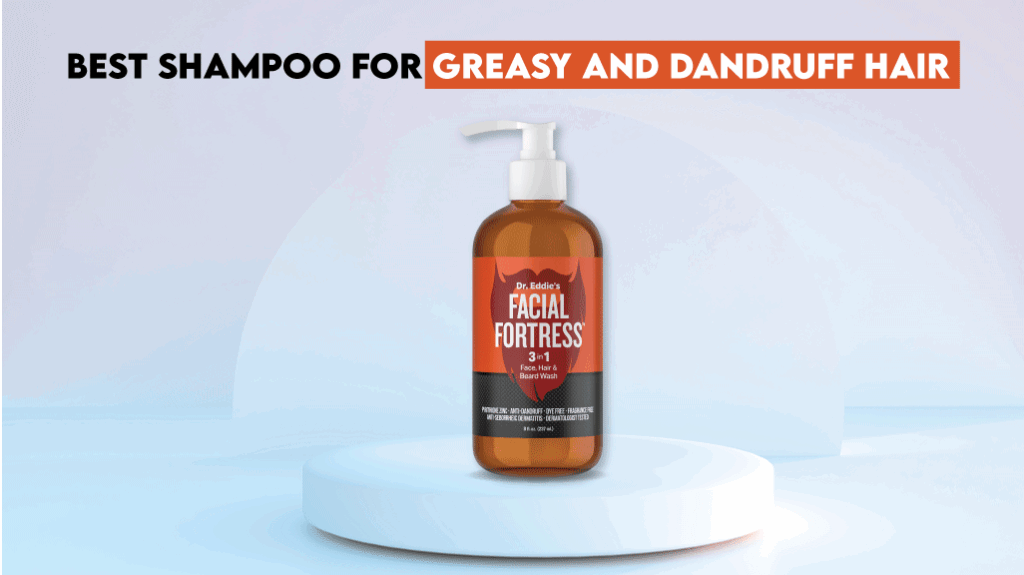
If you are dealing with greasy hair and dandruff and are looking for a good dandruff shampoo, then try Facial Fortress 3-in-1 Shampoo for men. It is specially developed by an expert pediatrician, Dr. Eddie, to help manage scalp and beard dandruff and seborrheic dermatitis.
It contains 0.95% pyrithione zinc as an active ingredient that helps reduce the growth of Malassezia yeast on the scalp and reduce the flaking, itching, and irritation associated with dandruff.
This shampoo for greasy dandruff hair is fragrance-free, paraben-free, and sulfate-free, which makes it safe to be used even on the most sensitive skin. The best part about it is that it can be used as a scalp shampoo, a face wash, and a beard wash to manage dandruff on beard.
Use it at least 2 to 3 times a week or as prescribed by the dermatologist to get the best results, and once the flaking is under control, use it once a week to prevent the dandruff from coming back.
Can Stress Cause Greasy Hair?
One question often asked about greasy hair is, “Does stress cause greasy hair?” Stress, even though it cannot directly cause greasy hair. However, when you are under continuous stress or are experiencing chronic stress, this can cause a hormonal imbalance in the body, which triggers the sebaceous glands to start producing excess sebum.
Additionally, some people have the habit of continuously touching their hair or scalp during stressful situations; this can also cause their hair to become greasy fast.
Key Takeaways
If your hair becomes greasy fast or quite often, then the main reason behind it is the production of sebum on the scalp. Excess sebum production can make your hair look greasy and oily.
However, there are other factors that trigger the sebum production and lead to oily hair, such as
- Hormonal changes in the body
- Overwashing or underwashing the scalp
- Using the wrong hair products
- Using a dirty hairbrush
- Dirty linens
- Touching your hair more often
- Weather conditions
- Dandruff
- Using hard water to wash your hair
- Certain hair care mistakes
No matter what is causing your greasy hair, the best way to manage it is to use a shampoo for oily, greasy hair to wash your scalp.
If you are dealing with dandruff on your scalp and beard, then try using Facial Fortress Anti-Dandruff Shampoo at least 2 to 3 times a week to reduce the flaking, irritation, and itching associated with dandruff.
Recent Post
Frequently Asked Questions
Why does my hair get greasy after one day?
How do I stop my hair from getting greasy so fast?
Is healthy hair more oily?
Is greasy hair a symptom of anything?
What is the best shampoo for greasy hair?
- Daily Beard Care Myths That Could Be Making Flakes and Itch Worse - March 3, 2026
- Dry, Flaky Skin Under Your Mustache? Causes, Quick Fixes, and Beard Care Tips - February 13, 2026
- How Often Should I Wash My Hair and Beard to Control Dandruff? (Doctor Guide) - February 13, 2026
